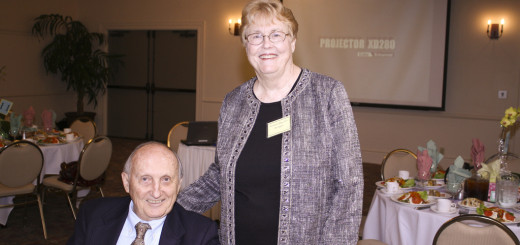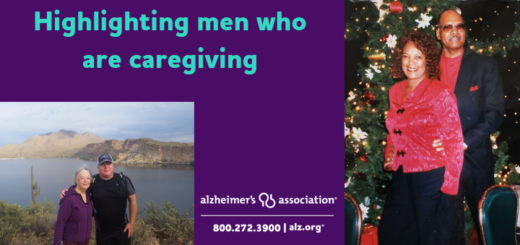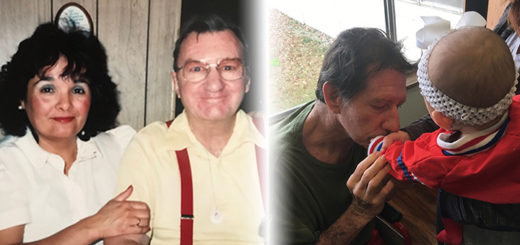Alzheimer’s and the Stonewall Generation
Researchers are learning more about the experiences of lesbian, gay, bisexual, transgender and queer or questioning (LGBTQ) adults who are living with Alzheimer’s or are caregivers. One of the leading researchers in this field is Dr. Jason Flatt from UC San Francisco.
June 28, 2019 marks the 50th anniversary of the Stonewall uprising, a pivotal moment in the LGBTQ history. During this year’s Pride Month, LGBTQ baby boomers “” nicknamed “The Stonewall Generation” “” are being honored as trailblazers of the LGBTQ movement.
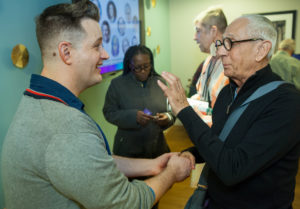
The number of LGBTQ seniors in the United States is increasing. By 2030 nearly 7 million LGBTQ people will be over aged 50.
The prevalence of Alzheimer’s disease in the LGBTQ community is still relatively unknown, but the Alzheimer’s Association estimates there are 350,000 sexual and gender minority older adults in the U.S. currently living with Alzheimer’s disease or a related disorder. That number is expected to increase to over a million by 2030 (McGovern, 2014; Flatt et al., 2018).
Depression in LGBTQ seniors
Dr. Jason Flatt of the University of California San Francisco School of Nursing is conducting one of the first studies on Alzheimer’s disease prevalence among LGBTQ seniors. His research has found that LGB older adults had higher rates of depression and other psychosocial challenges.
“This is concerning because we know that individuals with depression have a two- to three-fold increase in the odds of developing Alzheimer’s and related dementia compared to those without depression.” said Dr. Flatt. “We also know the LGBTQ community faces additional risks for social isolation and loneliness, as well as unique challenges around accessing inclusive care.”
Watch Jason discuss his research
Needs of LGBTQ seniors affected by Alzheimer’s
LGBTQ seniors living with Alzheimer’s Disease face unique challenges. They often experience discrimination when seeking health care and aging-related services. LGBTQ seniors also lack access to caregivers and supportive services for their caregivers.
For example, LGBTQ seniors are twice as likely to not have a spouse or partner. They are also twice as likely to live alone and up to four times less likely to have children. This greatly limits the opportunities for family caregiving.
Tips for providing affirming services
According to Dr. Flatt, “This should encourage us to learn more about the needs of our aging LGBT community and provide more affirming and supportive services.”
This includes meeting people “where they’re at” and acknowledging who they are. It also requires changing medical forms, recognizing and utilizing pronouns, and acknowledging families of choice, whether that’s a partner or a group of friends.
As part of his work Dr. Flatt has engaged with Openhouse, a non-profit organization in San Francisco. They are expanding inclusive and affordable housing and health services for LGBTQ seniors. This includes caregivers and persons living with Alzheimer’s. Dr. Flatt is also working with Openhouse and On Lok Lifeways to create California’s first social day program for LGBTQ seniors.
New research center focused on LGBTQI community
Due to the health care-related challenges they and others have faced, an LGBTQ person is less likely to look for and access services. They fear poor treatment due to their LGBTQ identity. They may also fear the stigma of being diagnosed with Alzheimer’s disease.
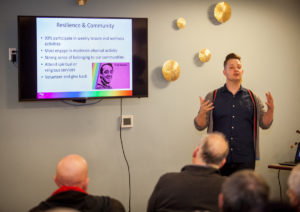
Dr Flatt and his colleague, Annesa Flentje, are building the first lesbian, gay, bisexual, transgender, queer/questioning and intersex (LGBTQI) Research and Clinical Training Center at UC San Francisco. The goal is to better train healthcare providers on affirming care for the LGBTQI community.
This Center will also allow expand research on LGBTQI health, including finding out more about specific contributors to Alzheimer’s among LGBTQI seniors.
More tips for providers
In 2018, the Alzheimer’s Association and SAGE Advocacy and Services for LGBT Elders released an issue brief on dementia and the LGBT community. Here are some of their suggestions for community providers and others who may work with LGBTQI seniors living with Alzheimer’s and their caregivers:
- Recognize the role of ageism in LGBTQ communities
- Encourage education around early detection and diagnosis of Alzheimer’s disease
- Help LGBTQ people plan for the future
- Locate caregiver respite or support groups, making sure existing groups are welcoming to LGBTQ people
- Partner with local organizations
- Include older adults in your Pride planning
- Connect outside of social media
Dr. Flatt will be speaking as part of a panel on helping LGBT seniors age at home. The session will be held on June 19 at 6:30 p.m. in San Francisco at the Commonwealth Club of California. Learn more or purchase tickets.
Dr. Flatt is supported by U.S. National Institutes of Health/National Institute on Aging, K01AG056669.
Learn More:
- Alzheimer’s Association resources for LGBT community
- Article on NIH grant received by Dr. Flatt
- LGBT and Dementia issue brief
- Openhouse San Francisco
- Rainbows of Aging research coalition
- SAGE Advocacy and Services for LGBT Elders
References
McGovern, J. (2014). The forgotten: Dementia and the aging LGBT community. Journal of Gerontological Social Work, 57(8), 845-857.
Flatt, J. D., Johnson, J. K., Karpiak, S. E., Seidel, L., Larson, B., & Brennan-Ing, M. (2018). Correlates of Subjective Cognitive Decline in Lesbian, Gay, Bisexual, and Transgender Older Adults. Journal of Alzheimer’s Disease, (Preprint), 1-12.





